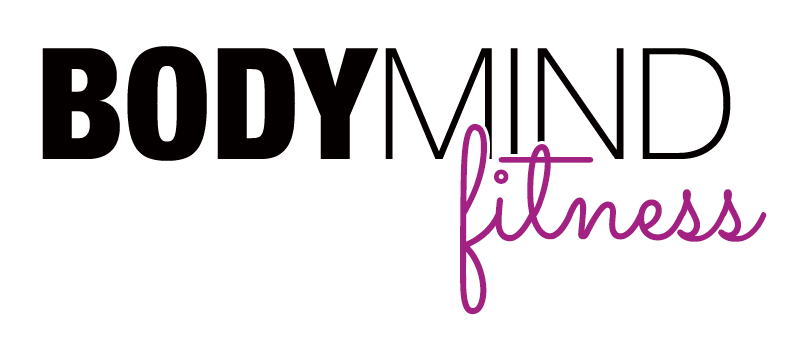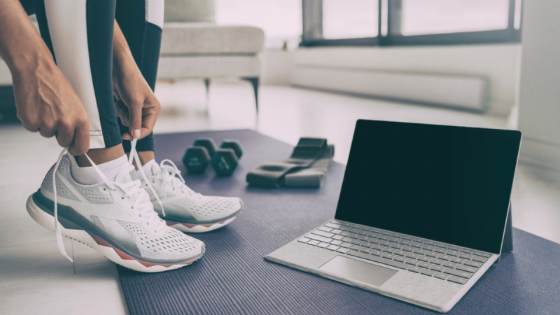Disclaimer: The information provided in the following post is not intended to diagnose or treat any illness or injury. It is for educational purposes only. If you choose to try any of the tips or exercisers presented here, you do so at your own risk. Please consult your physician or health care provider before you start any program. Not every nutrition plan or exercise program is safe for every person. Correct execution of all exercises and nutrition programs is imperative to prevent injury or other adverse effects. Please consult your healthcare professional if you have any questions about the program, or if the following information is right for you. You are responsible for yourself and will not hold Body Mind Fitness or any of its agents liable for any illness or injury,
Many know me as a personal trainer, yoga teacher, and core + pelvic floor expert. What many don't know is that I'm also a nutrition coach, but I don't take the typical approach to nutrition that many fitness professionals take. I truly believe that all foods fit, and no foods should be put on some sort of black list. I don't believe in overhauling your entire "diet" in one fell swoop, but instead taking small steps in the direction of the relationship you want with food, sticking with those smalls steps until they feel second nature, and then adding the next small step.
And never ever feeling guilty about the choices we make around food.
With that said, it breaks my heart when I hear that people feel out of control around food, especially in the evening, which brings me to today's blog post. The most common question I get is "how can I stop snacking at night," and typically this isn't about having a single cookie, but devouring half the box in one sitting without even realizing you did it, which is usually met with physical discomfort following that binge fest.
Now there's a number of reasons why night snacking may be part of your nightly routine, which typically falls in one of two buckets: physiological and psychological, and it's outside of my scope of practice to determine which one you may fall into. But I do notice some common threads when I sit down and talk to people during our initial assessment, and when we address these threads with a plan, the results are outstanding.
If you've been in my world for awhile, you know I love to share some practical tips with you, that you can start using right away, and I promise you - I'll get to them shortly, but it's really important to understand where my tips are coming from, and seeing if you see yourself in this particular scenario, but as always it's best to speak with your healthcare provider before implementing these tips. I also want you to know that whatever experience you're having right now, you're not alone and you don't have to rid your house of "temptation foods." Remember that all foods have a place, and it's not about villainizing any food. Food is delicious, and the source of many gatherings, good times and laughter. Never forget the impact these events can have on us psychologically. It's a beautiful thing.
The diet industry is a multi-billion dollar industry that relies on you failing at whatever diet you're trying out. I encourage to ask my clients, to ask themselves this question every time they want to dive into a program that promises results fast (because realistically who wouldn't want that?), "is this is something you could do forever?" If the answer is no - turn around and run, don't just walk… run away, because as soon as you come off that diet you're going to gain everything back and then some.
When we deprive our bodies of food, we go into starvation mode, where the body does its best with the resources it has, but then wants to make up for the resources it lost, and the next time around... our metabolism adapts and essentially holds onto things like fat longer preparing for the next time you enter starvation mode. This is build into our DNA from back in the hunger and gatherer days when resources in one place ran out, and we neeed to pack up and leave in search of new home with lush resources.
Back to the topic at hand. Some of the most common things that come up when talking about what a new client's daily food intake looks like during our initial assessment is:
- skipping breakfast
- skipping lunch or extremely light lunches
- eating very small portions
- skimping on protein until dinner time.
- proudly explaining that they're not even hungry until dinner time
- and then the aforementioned topic of this blog - late night snacking.
Now truth be told, if you're bingeing late into the night, there's a good chance you really aren't hungry in the morning and don't need breakfast, I've been there myself, and it's a vicious cycle that takes some time to break. But when we get hungry or even start to feel like we're "starving", it's really hard to make choices, we unleash this primal instinct state to get food into our body as quickly as humanly possible. And often times that involves highly processed foods (because they're quick), and foods you don't have to prepare. The fastest and easiest way to get food into your belly, and usually these foods are oh so delicious.
In short, when hunger sets in, it becomes virtually impossible to make choices, but there's a box of cookies all set and ready for you to consume in your cupboard. So what do you do?
Start eating more food.
I know, it feels like the opposite of what you want to do, but essentially this allows us to crowd out the "bad" foods, so you don't enter that starvation mode. Especially when we start prioritizing things like protein. Because it takes more time to digest protein, which leaves you fuller for longer, and it takes more energy to break down protein - meaning you burn more calories during the digestion of protein.
Don't take this out of context, this is just one example, I'm not saying all protein all the time, and only protein - fats and carbs need to be part of your regular diet as well. Yes, you heard that right - fats and carbohydrates. Carbs are your body's favourite way to make energy (feeling sluggish? Eat some carbs, my friend). As for fats, they have a few jobs, energy of course, but also supporting cell function, absorbing certain vitamins and minerals, protecting your organs and keeping your body warm. Protein, carbs and fats are called macronutrients and as you can see they need to be part of your daily food intake.
Here's another fun fact, it's recommended that you consume food every 2-3 hours, so you don't enter that primal hunger stage where all bets are off. So snacks are your best friend and shortly, I'll share a sample day, as well as some suggestions, but before that I want to remind you - don't overhaul your entire way of eating in one day. Small steps, implement one change, notice the effects on your life, and once it becomes second nature, add the next step.
Reminder: The massive promise of fast results sounds enticing, I get that - and truth be told, I've been there myself. But these results won't last, because it's impossible to do what's being asked of you in big loss diet programs for the long term. You've got this.
As promised, I wanted to share with you a sample of what a day could look like including some ideas that come straight from the things that I do.

Water with Lemon and Ginger
This is the very first thing I consume every morning, even before my morning cup of coffee. This elixir promotes hydration and helps to stimulate the digestive system, for me personally it helps immensely with my celiac disease. I also have seasonal allergies, so I like to add a teaspoon of local honey, and who knows, maybe it's a myth, but when I am on top of my daily local honey intake my spring allergies are virtually non existent. Plus it tastes good.

Breakfast with Protein
Here's the thing about breakfast, it jumps starts the body to start working for the day. I'm better at my workouts, and more productive throughout the day. Now, I will say, I'm a big believer of choosing whole foods above some sort of fancy shake, however, I'm a mom of 4, and 2 of them still need a whole lot of help getting ready for school so Monday-Thursday I have a Berry Banana Smoothie with protein and flax seeds. Friday-Sunday, 2 eggs along with whatever else I'm eating on those particular days.

Fruit Snack 2 or 2.5 hours after Breakfast
I'm not talking about those delicious gummies from my childhood memories... though have at it if you'd like. Typically, I have some sort of fruit and usually it's an apple.
Lunch with a focus on Vegetable 30 mins to 3.5 hours after your Snack
I have had a love/hate relationship with salads, and I realized this past summer, it's because the salads I make for myself are boring. Lettuce, tomatoe, cucumber and whatever dressing as on sale. In the summer when we were travelling, and eating out A LOT, it got to the point where I needed more veggies in my life, and started eating salads... specifically something with goat cheese and beets. Once I got home, I started playing more with my salad toppings, and experimenting with different dressings - so I actually want to eat the damn salad. Feel free to add some chicken on top for a little more protein.

Raw Veggies Snack 30 mins to 3.5 hours after Lunch
Because I put so much effort in to lunch and dinner, I keep this really simple and usually that's carrots and roasted garlic humus.

Nuts and Seeds Snack 30 min to 3.5 hours after Raw Veggie Snack
Again, simplicity. I head to my local bulk food place and pick up raw almonds typically, but I also check out some of the other things that are around, and again experimenting. Trying new things, stepping out of my bubble. Food can be fun!

Dinner with a Focus on Protein and Vegetables
What's your dinner plate look like? I grew up with a Polish mom, meat and potatoes were the meals every night, with an itty little bit of salad. Now I'm knocking potatoes, I still love them. But did you know that it's recommended that half of your plate is vegetables? It's hard in this day and age, especially when produce is so expensive. But meat and salad are my main event, with a smaller portions of potatoes, because for my energy I get way more out of veggies and meat, than potatoes.
Consistency
When many of us think about "consistency" we think we need to be 100% perfect all of the time. But I would like to take a moment to reframe that, aim for 80% consistency. This is what leaves room to enjoy the good stuff in life. Perfection is impossible to attain in just about everything in life, no matter how much we try. When we inevitably fail, that search for perfection makes it so much harder to bounce back, get back to our goals, and continue making strides. There's no such thing as bad foods, and when we start to peel back the layers and stop this line of thinking, those "bad foods" will have space in our lives without feeling of guilt.
Bon Appétite!
Now before I sign off, I want to remind you that these are general recommendations. Please consult your doctor and healthcare team before trying out any type of food changes, especially if you're dealing with any illnesses, diseases, etc. Everyone's needs are different, and I highly recommend searching for a nutrition coach or dietician to help you through any food changes you would like to make. If you're interested in seeing if it's the right fit for you, you can book your $0 consultation by heading here.
As always, I look forward to connecting with you again very soon.
In gratitude,








